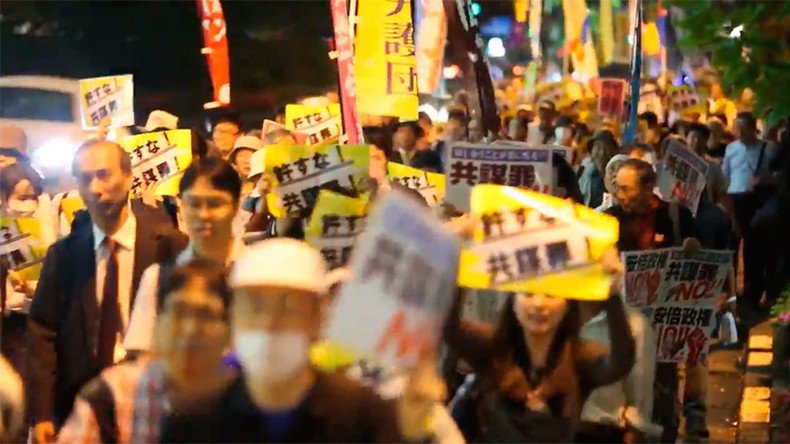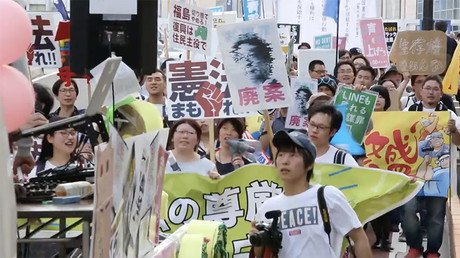Thousands protest Japan’s controversial ‘anti-conspiracy bill’ (PHOTOS, VIDEO)

Thousands of Japanese protesters flooded the streets of Tokyo to condemn Japan’s lower house’s approval of a so-called “anti-conspiracy” bill designed to crack down on organized crime and punish those planning to commit “serious crimes” against the state.
On Tuesday, Japan's House of Representatives, approved the so-called “conspiracy bill,” which lists 277 new types of offenses which lawmakers say threaten Japanese national security.
Tokyo argues the legislation needs to be adopted ahead of the Tokyo Olympics in 2020 to fight terrorism and organized crime. The Japanese government also says that the bill is necessary to ratify United Nations' Convention against Transnational Organized Crime.
労働法制の改悪と共謀罪の創設に反対する連帯集会
— 金蜜 (@mkimpo_kid) May 24, 2017
労働運動と市民運動は「共謀」しよう!
日比谷野外音楽堂~銀座デモ!
主催:労働運動と市民の連帯をめざす一日実行委員会
協力:戦争させない・9条壊すな!総がかり行動実行委員会 pic.twitter.com/YTjWs7PfER
Opponents of the new measures argue that the government will now be able to prosecute those who have nothing to do with terrorism or serious crime enterprises. Critics further fear the legislation could equate such offenses as sit-in protests and violations of copyrights to “serious crimes.”
【5.24労働法制の改悪と共謀罪創設に反対する連帯集会】今夜は約2500人の参加でした!これからデモ出発します。 pic.twitter.com/aqfzv4itI3
— 戦争をさせない1000人委員会 (@committeeof1000) May 24, 2017
The proposed bill needs to be ratified by the upper house, the House of Councillors, before it becomes a law. It is expected to be enacted as the ruling coalition also has a majority in the upper house.
@poem_japan 目立つなあ。#最低賃金を1500円にpic.twitter.com/2bhQXKGkNG
— AEQUITAS /エキタス (@aequitas1500) May 24, 2017
Recalling the Japanese police state policies of the 1930-1940’s, thousands of Japanese took to the streets to decry the erosion of their civil liberties and to protest increased police powers.
Protesters carried placards condemning Japanese Prime Minister Shinzo Abe’s government. They also chanted slogans venting their opposition to several other issues, including Japan's nuclear power policies, the American presence in Okinawa and an increase in the hourly wage.
A recent survey by the Kyodo News agency revealed a public split over the bill, with 39.9 percent supporting the legislation and 41.4 percent opposing it.
Last week, the UN special rapporteur on the right to privacy also voiced concern over the new bill in an open letter to Abe, arguing the law would include offenses that have nothing to do with organized crime or terrorism.
“Serious concern is expressed that the proposed bill, in its current form and in combination with other legislation, may affect the exercise of the right to privacy as well as other fundamental public freedoms given its potential broad application,” the letter from rapporteur Joseph Cannataci said.
In response, the Japanese government sent a letter of protest to the UN. Chief Cabinet Secretary Yoshihide Suga has also dismissed UN concerns over possible violations of privacy as “utterly incorrect.”













